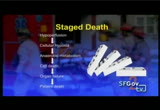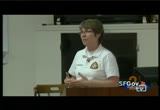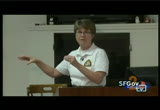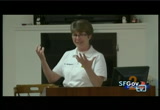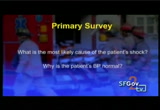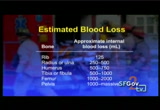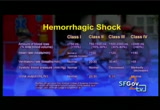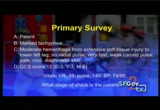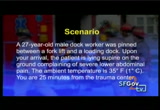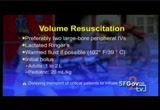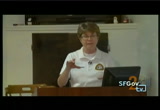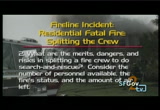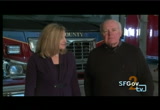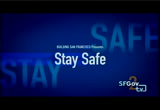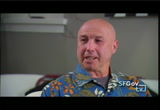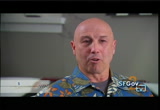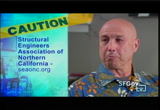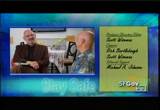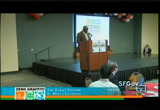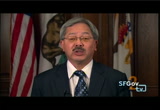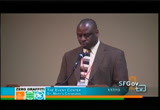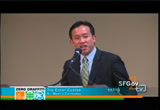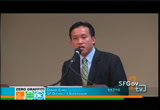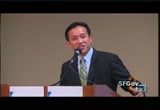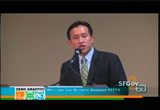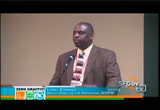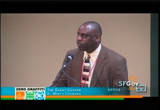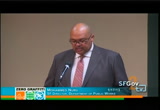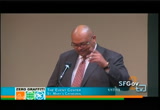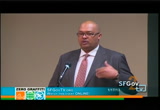tv [untitled] April 20, 2013 2:44pm-3:14pm PDT
2:56 pm
>> hi, i'm lawrence corn field. welcome to building san francisco. we have a special series, stay safe. we're looking at earthquake issues. and today we're going to be talking with a residential building owner about what residential building owners and tenants can and should do before earthquakes and after earthquakes. ♪ ♪
2:57 pm
>> we're here at this wonderful spur exhibit on mission street in san francisco and i have with me today my good friend george. thanks for joining me, george. and george has for a long time owned residential property here in san francisco. and we want to talk about apartment buildings and what the owner's responsibilities might be and what they expect their tenants to do. and let's start by talking a little bit about what owners can do before an earthquake and then maybe after an earthquake. >> well, the first thing, lawrence, would be to get together with your tenants and see if they have earthquake insurance or any renters insurance in place because that's going to be key to protecting them in the event of a quake. >> and renters insurance, there are two kinds of insurance. renters insurance coffers damage to goods and content and so forth. earthquake insurance is a
2:58 pm
separate policy you get after you get renters insurance through the california earthquake authority, very inexpensive. and it helps owners and it helps tenants because it gives relocation costs and it pays their rent. this is a huge impact on building owners. >> it's huge, it really is. you know, a lot of owners don't realize that, you know, when there is an earthquake, their money flow is going to stop. how are they going to pay their mortgages, how are they going to pay their other bills, how are they going to live? >> what else can property owners do in residential rental housing before an earthquake? >> well, the first thing you want to do is get your property assessed. find out what the geology is at your site. get an expert in to look at structural and nonstructural losses. the structural losses, a lot of times, aren't going to be that bad if you prepare. an ounce of prevention is worth a pound of cure. get in there and get your property assessed and figure it out. >> so, what is a nonstructural
2:59 pm
issue that might cause losses? >> well, you know, pipes, for instance. pipes will whip around during an earthquake. and if they're anchored in more numerous locations, that whipping won't cause a breakage that will cause a flood. >> i've heard water damage is a major, major problem after earthquakes actually. >> it is. that's one of the big things. a lot of things falling over, ceilings collapsing. but all of this can be prevented by an expert coming in and assessing where those problem areas and often the fixes are really, really cheap. >> who do you call when you want to have that kind of assessment or evaluation done? >> the structural engineering community is great. we have the structural engineers association of northern california right here in san francisco. they're a wealth of information and resources. >> what kinds of things might you encourage tenants to do besides simply get tenants renters insurance and
3:00 pm
earthquake insurance, what else do you think tenants should do? >> i think it's really important to know if they happen to be in the building where is the safest place for them to go when the shaking starts. if they're out of the building, whats' their continuity plan for connecting with family? they should give their emergency contact information to their resident manager so that the resident manager knows how to get in touch. and have emergency supplies on hand. the tenants should be responsible to have their extra water and flashlights and bandages and know how to use a toilet when there's no sewage and water flows down. and the owners of the building should be proactive in that regard as well. >> so, george, thank you so much for joining us. that was really great. and thanks to spur for hosting us here in this wonderful exhibit. and thank you for joining us m.
3:01 pm
my name is larry -- and i'm chair of the san francisco graffiti advisory board and deputy director of operations, department of public works. welcome to zero graffiti international conference. (applause) this morning you will hear from several great speakers and i hope that you are all ready for a fantastic conference. there's a lot to get from today. i want to be brief and move things along.
3:02 pm
mayor ed lee could not be here this morning but he is very excited about this event and prepared a welcome via video. now the honorable mayor of the city and county of san francisco mayor ed lee. >>: hello. i'm mayor ed lee. it is my pleasure to welcome you to san francisco and the first of its kind, zero graffiti international conference. san francisco is proud to be the innovation capital of the world because we believe that finding solutions to graffiti vandalism or to solve any other challenges is driven by how successful the we embrace and encourage innovation. we continuously seek out ways to leverage new technologies, reduce cost, find efficiencies, and create meaningful public/private order 68
3:03 pm
in the cities unification efforts. the thing today, zero graffiti for a beautiful city is one whole world can embrace. i hope that you are inspired today and throughout the conference to exchange ideas and find solutions to improve the quality-of-life in your city. thank you for your dedication and commitment to eradicate graffiti vandalism. keep up the great work and enjoy our world-class city. (applause) >>: next, i'm mayor ed lee -- ( laughter) >>: alright, i'd like to introduce a champion of -- (indiscernible) to take advantage of san francisco's cutting edge -- to keep the city clean and
3:04 pm
green. we are delighted to have him here say a few words. (indiscernible) he also was one of our speakers that participated at the first conference of the graffiti advisory board in 2009. currently the president of the board of supervisors, and the supervisor for district 3. president david chiu. >> supervisor chiu: good morning. i am not ed lee. on behalf of the elected officials of san francisco one walk and you, home of the world champions san francisco giants.
3:05 pm
the home of innovation. san francisco the place where we spent many years trying to fight graffiti; we have not reached the place where we are at zero graffiti. i spent a lot of time as a neighborhood activist. like many of you, i spent many hours in neighborhood cleanups, using different chemicals to deal with graffiti; as a small business owner person i heard from hundreds of merchants. as a prosecutor i'm glad i don't recognized any of you. i recognize how difficult it is for the police and judges to
3:06 pm
prioritize. graffiti needs to be treated seriously. i want to thank those of you who were part of the 2009 program. we have an amazing rewards program; a graffiti advisory board to help us innovate. we feel that the best ideas are in the heads and the brainchilds of people around the world. how many are from california? how many from the east coast? welcome. i hope it's a -- in the west coast. how many are from the midwest and the south? thank you for coming. how many from canada?
3:07 pm
welcome to all of you. anyone from across the pond, europe? sir i welcome you to san francisco. i want to thank all of the city staff here lead by -- the department of public works. we know that graffiti impacts every neighborhood. as the city not only does the department of public works spend four million dollars a year but collectively we spend 20 million dollars fighting this crime. we can do better.
3:08 pm
i look forward to a fruitful conference and hopefully someday stamp out graffiti. thank you very much. (applause) >>: thank you supervisor chiu. the next person i'm going to introduce, he is and original graffiti fighter, past chair of the graffiti advisory board and the main reason you are here. -- international conference was something he wanted to see in san francisco. mohammed -- has worked in san
3:09 pm
francisco -- responsible for dozens of community engagement programs, (indiscernible) (indiscernible) he knows every inch of this city as a steward of this beautiful, vibrant city. (indiscernible) strengthening and improving the community with partnership and support. (indiscernible) he was responsible for the first conference in 2009, he is responsible for the ideas - welcome mohammed -- (applause) >>: thank you larry.
3:10 pm
good morning everyone. how is everyone doing today? i am so excited to join our mayor, david chiu, larry welcoming you to san francisco. (indiscernible) fighting this issue of graffiti in our city. (indiscernible) we have planned this for a while. the issue of graffiti -- not just san francisco but many other cities. all over the world. tackling this problem. let me start by saying we have a very beautiful city, 49 square miles, second most dense
3:11 pm
city in america. (indiscernible) we have several neighborhood groups. you will hear a lot of people talk about the issue. the conference will be a great -- (indiscernible) are able to learn more and share ideas and -- in our communities. we also have -- (indiscernible) because of the giants, the 49ers, the other sports. (indiscernible) >>: okay. it's a partnership. and finding solutions that
3:12 pm
solve problems by all of us coming together and talking about what we do. as you heard on the public works side of the table, we are responsible for regulating graffiti, enforcing the ordinances, we have a voice -- (indiscernible) we take 30,000 calls at a minimum every year. (indiscernible) it's a huge problem. i have worked for the department for over 12 years -- (indiscernible) a problem growing more and more. (indiscernible) (indiscernible) --
3:13 pm
something we hear ideas on. how many people were here yesterday? another way to connect. that's what this conference is. able to se -- i have new ideas as we tackle the problem of graffiti. within the department, with the help of the graffiti advisory board we have been able to tackle some of the problems in very creative ways. one that i am very proud of is a program called -- program. it's a program where we went to the community, looked for various artists andsk
73 Views
IN COLLECTIONS
SFGTV2: San Francisco Government Television Television Archive
Television Archive  Television Archive News Search Service
Television Archive News Search Service 
Uploaded by TV Archive on

 Live Music Archive
Live Music Archive Librivox Free Audio
Librivox Free Audio Metropolitan Museum
Metropolitan Museum Cleveland Museum of Art
Cleveland Museum of Art Internet Arcade
Internet Arcade Console Living Room
Console Living Room Books to Borrow
Books to Borrow Open Library
Open Library TV News
TV News Understanding 9/11
Understanding 9/11